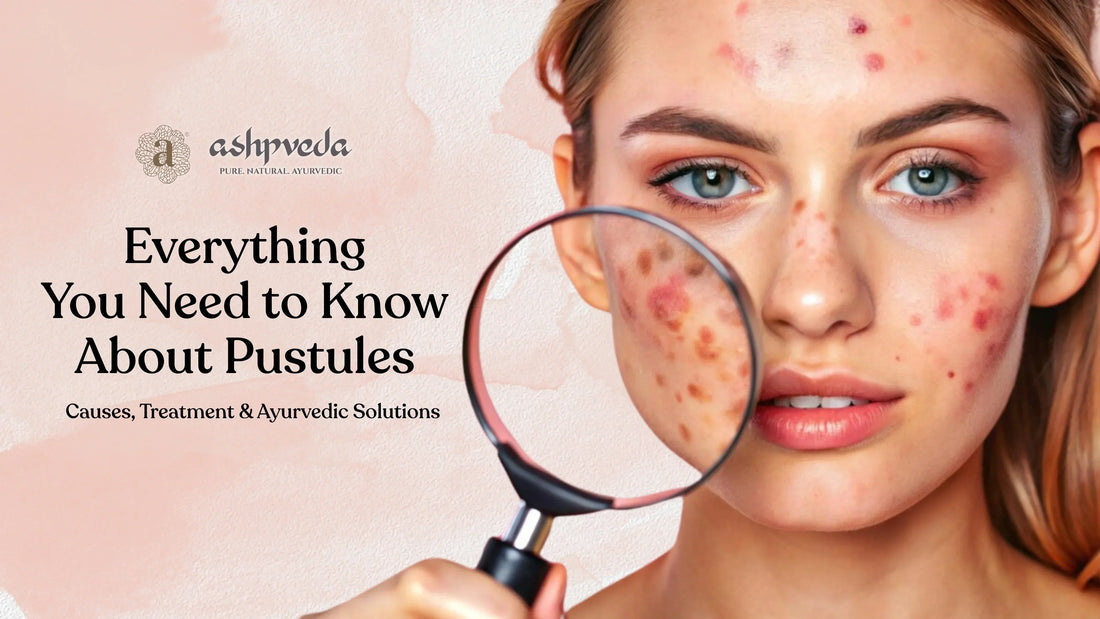
Pustules are small, inflamed, pus-filled bumps that can appear anywhere on the body. They are commonly associated with acne but can also result from infections, allergic reactions, or inflammatory skin conditions like psoriasis or rosacea. Understanding their causes and treatments is essential for effective management.
What Are Pustules?
A pustule is a small, raised bump on the skin containing pus. These bumps are typically white or yellow at the center and surrounded by red, inflamed skin. They often appear on the face, chest, back, shoulders, and scalp.
Causes of Pustules
Pustules form when pores or hair follicles become clogged with oil, dead skin cells, and bacteria. The immune system responds by sending white blood cells to fight the infection, resulting in pus formation.
Common causes include:
-
Acne vulgaris: The most prevalent cause, especially among teenagers and young adults.
-
Folliculitis: Inflammation of hair follicles, often due to shaving or friction.
-
Contact dermatitis: An allergic reaction to irritants or allergens.
-
Chickenpox or smallpox: Viral infections that can cause pustules as part of the rash.
-
Psoriasis (particularly pustular psoriasis): A severe form of psoriasis involving pus-filled blisters.
- Infections: Bacterial, viral, or fungal infections can lead to pustule formation.
Treatment Options
At-Home Treatments
-
Topical Treatments: Over-the-counter products containing benzoyl peroxide, salicylic acid, or retinoids can help clear up pustules.
-
Good Hygiene: Wash affected areas with a gentle cleanser twice daily.
-
Avoid Picking: Picking or popping pustules can cause infection or scarring.
-
Warm Compresses: Help reduce inflammation and promote drainage.
Read this also: Best Soaps for Acne or Pimple
Ayurvedic Skincare Solutions from Ashpveda
Incorporating Ayurvedic products into your skincare routine can provide natural and effective relief from pustules. Here are some recommended products:
Product Highlights:
-
Ashpveda Natural Radiant Kashmiri Saffron and Neem Face Wash: This face wash combines saffron and neem to treat acne, balance skin, moisturize, and improve skin immunity. It also reduces excess oil on the face.

-
Ashpveda Shop Best Ayurvedic Night Cream for Skin Brightening: Enriched with sandalwood and saffron, this night cream aids in skin healing, anti-pigmentation, and brightening, making it suitable for acne-prone skin.

- Ashpveda Cleanse & Hydrate Kit: This kit offers a comprehensive skincare routine, including cleansing and hydration, essential for maintaining healthy skin and preventing pustules.
Let's read this also: Why Natural Ingredients Matter in Skincare
When to See a Doctor
Consult a dermatologist if:
- Pustules are painful, spreading rapidly, or not improving with over-the-counter treatments.
- You have a fever or other signs of systemic infection.
- You suspect a skin condition like psoriasis or rosacea.
- The pustules return frequently or leave scarring.
Prevention Tips
- Maintain a consistent skincare routine.
- Avoid heavy or greasy cosmetics and lotions.
- Shower after sweating to remove bacteria and oil.
- Change pillowcases and towels regularly.
- Manage stress and diet, which can impact skin health.
Final Thoughts
Pustules may be frustrating, but they're a common skin concern with many treatment options. Understanding what causes them and how to treat them effectively is key to keeping your skin clear and healthy. Incorporating Ayurvedic products like those from Ashpveda can provide natural and effective solutions. If you're unsure about a breakout or concerned about a recurring issue, it's always wise to consult with a dermatologist.
FAQs About Pustules
Q: Are pustules contagious?
A: Most pustules are not contagious, especially those related to acne. However, pustules from infections like impetigo or chickenpox can be.
Q: Can I pop a pustule?
A: It's best not to. Popping can introduce more bacteria and lead to scarring or infection. Use treatments instead to help them heal naturally.
Q: How long do pustules last?
A: Mild pustules often resolve in a few days to a week with proper care. Persistent pustules may need medical treatment.
Q: Are pustules the same as pimples?
A: All pustules are pimples, but not all pimples are pustules. Pustules specifically refer to pimples filled with pus.
Q: Do diet and lifestyle affect pustules?
A: Yes, diets high in sugar or dairy and stress may worsen acne and lead to more pustules. A healthy lifestyle can help improve skin condition.






